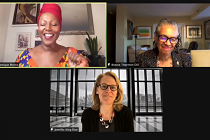Monique Morris discusses her documentary on criminalization of Black girls at UMD webinar
By Lexi Gopin
The trailer for the documentary PUSHOUT: The Criminalization of Black Girls in Schools, begins with a viral video of a young Black girl being pulled out of her desk at school and slammed to the ground by a school officer. The video is both horrifying and infuriating, but it is not an isolated incident. Dr. Monique Morris, an award-winning author and scholar, joined the University of Maryland’s education and arts and humanities colleges as a part of a lecture series Tuesday night to discuss her documentary, based on her 2015 book PUSHOUT.
Morris spoke about the documentary, the research methods within the film and what people can do to end the criminalization of Black girls in schools. The webinar cut across the intersections of race and gender in the education system and brought to light an important way to uphold justice: showing up as your authentic self without being a savior.
To contextualize the issue, Morris explained how the U.S. Education Department originally organized the school-to-prison pipeline data by race and sex separately, which ignored the major injustices Black girls face in school.
“We heard cases that included 6- and 7-year-old Black girls arrested for having tantrums in their classrooms, or Black girls getting suspended for wearing head wraps during Black History Month, or thrown around by school resource officers,” Morris said.
These stories weren’t the main focus of the conversation surrounding the school-to-prison pipeline, and they were treated as isolated incidents. It wasn’t until the UCLA Center for Civil Rights analyzed this data and brought to light a problem many already knew was true: that Black girls were facing more expulsions than boys.
Morris pointed to a study from the Georgetown Center of Poverty and Inequality that said Black girls are more likely to be suspended than white girls, even for minor violations. Despite this, the conversation at that time still focused on boys and men.
This is why Morris’ documentary is critical within the conversation of justice and equality in the education system for Black girls.
A large part of the film is interviews with young Black girls about their personal experience in which they are looking directly into the camera. Morris said this was intentional.
“We wanted girls to directly engage the viewer to call upon an element in the viewing of the film that would invite the viewer to be much more engaged and not a passive person experiencing this film, but to actually feel as if they’re in conversation with her,” she said.
The interviews were included in the film to highlight the experiences that back up the numbers, facts and statistics we often see in documentaries.
Morris reflected on one story of a 16-year-old girl she worked with who had been sex trafficked and was in foster care.
“The school captured her as a girl who was constantly in fights and never showing up to class,” she said. “And what they were missing were all of these life traumas that were informing why she was absent, why she was fighting, why she felt disconnected to her learning space.”
This story brought up an important point for Morris; by bringing her “full self” to the conversation, she was able to connect and understand the experience of this young girl.
“No one had asked her about her educational goals until I stepped into that room and was the first person to talk to her about what might be possible for her,” she explained.
Morris said that is the best way to take part in the movement and to keep young girls in school and away from the juvenile court system. Morris also said it’s important to aid the healing process instead of disciplining young girls. The experiences of the girls Morris has worked with showed her “how dire it is that our schools become locations for healing so that they can become locations for learning.”
Morris is the executive director for the organization Grantmakers for Girls of Color that works to advance conditions for Black, Indigenous and other girls of color. She is also the founder of the National Black Women’s Justice Institute and started a COVID-19 response fund, as well as the Black Girl Freedom Fund.
“Our function is not to save Black girls, but rather to help them pull out the wisdom that already exists in their bones, and remember who they are, and structure our engagement with them in the development of tools that will help them be whole to live just and liberated lives,” she said.





